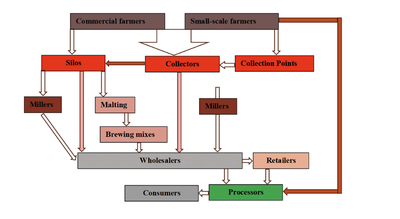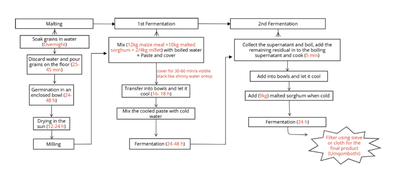Practice abstract 1
Value chain analysis of Umqombothi in South Africa
15 July 2025
Background. Umqombothi is a traditional South African beer made from maize, sorghum and sometimes pearl millet. Umqombothi was referred to as ‘kaffir’ beer in the 1950s, particularly in South African mining communities. The beer possesses profound cultural significance among black South Africans.
Objective. The main objective is to provide a general overview of the Umqombothi value chain in South Africa and to describe the product process and characteristics.
Results. Although malted sorghum is the primary inoculum (spontaneous fermentation) in most cases, some producers opt for yeast or commercially available beer as alternatives. Furthermore, the temperature (22–28°C) and fermentation times (2 to 4 days) vary among producers, reflecting diverse practices in informal umqombothi production, thus leading to many variations in product quality.
Umqombothi is susceptible to spoilage if not consumed promptly, typically 1-2 days. Inconsistent ingredients quality can lead to batch failures during fermentation, occasioning quality (sensorial) and safety problems and waste. In informal brewing settings, food safety and hygiene protocols are often minimal, making it challenging to ensure the safety quality of the final product. Processors that process their own grains sometimes use sun-drying to reduce the moisture content of the grains. When poorly dried or/and stored, grains are susceptible to fungal growth - that could be accompanied by subsequent production of harmful mycotoxins – and to (potential pathogen- containing) bacterial growth. Two case studies consisting of two groups of interconnected business operators within the Umqombothi value chain have been selected.
Recommendations. An in-depth analysis of the selected case studies, based on a precise multi- dimensional approach by a multidisciplinary team -including socio-economists, microbiologists and food technologists- will lead to recommendations.


